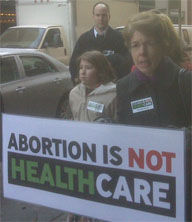The United States Conference of Catholic Bishops offers the following clarifications regarding the Health and Human Services regulations on mandatory coverage of contraceptives, sterilization and abortion-inducing drugs.
1. The mandate does not exempt Catholic charities, schools, universities, or hospitals. These institutions are vital to the mission of the Church, butHHS does not deem them “religious employers” worthy of conscience protection, because they do not “serve primarily persons who share the[ir] religious tenets.” HHS denies these organizations religious freedom precisely because their purpose is to serve the common good of society—a purpose that government should encourage, not punish.
 2. The mandate forces these institutions and others, against their conscience, to pay for things they consider immoral. Under the mandate, the government forces religious insurers to write policies that violate their beliefs; forces religious employers and schools to sponsor and subsidize coverage that violates their beliefs; and forces religious employees and students to purchase coverage that violates their beliefs.
2. The mandate forces these institutions and others, against their conscience, to pay for things they consider immoral. Under the mandate, the government forces religious insurers to write policies that violate their beliefs; forces religious employers and schools to sponsor and subsidize coverage that violates their beliefs; and forces religious employees and students to purchase coverage that violates their beliefs.
3. The mandate forces coverage of sterilization and abortion-inducing drugs and devices as well as contraception. Though commonly called the “contraceptive mandate,”HHS’s mandate also forces employers to sponsor and subsidize coverage of sterilization. And by including all drugs approved by the FDA for use as contraceptives, theHHS mandate includes drugs that can induce abortion, such as “Ella,” a close cousin of the abortion pill RU-486.
4. Catholics of all political persuasions are unified in their opposition to the mandate. Catholics who have long supported this Administration and its healthcare policies have publicly criticized HHS’s decision, including columnists E.J. Dionne, Mark Shields, and Michael Sean Winters; college presidents Father John Jenkins and Arturo Chavez; and Daughter of Charity Sister Carol Keehan, president and chief executive officer of the Catholic Health Association of the United States.
5. Many other religious and secular people and groups have spoken out strongly against the mandate. Many recognize this as an assault on the broader principle of religious liberty, even if they disagree with the Church on the underlying moral question. For example, Protestant Christian, Orthodox Christian, and Orthodox Jewish groups–none of which oppose contraception–have issued statements against the HHS’s decision. The Washington Post, USA Today, N.Y. Daily News, Detroit News, and other secular outlets, columnists, and bloggers have editorialized against it.
6. The federal mandate is much stricter than existing state mandates. HHS chose the narrowest state-level religious exemption as the model for its own. That exemption was drafted by the ACLU and exists in only 3 states (New York,California,Oregon). Even without a religious exemption, religious employers can already avoid the contraceptive mandates in 28 statesby self-insuring their prescription drug coverage, dropping that coverage altogether, or opting for regulation under a federal law (ERISA) that pre-empts state law. TheHHS mandate closes off all these avenues of relief.
Additional information on the U.S. Catholic bishops’ stance on religious liberty, conscience protection and the HHSruling regarding mandatory coverage of contraceptives, sterilization and abortion-inducing drugs is available at https://www.usccb.org/issues-and-action/religious-liberty/conscience-protection/index.cfm.







